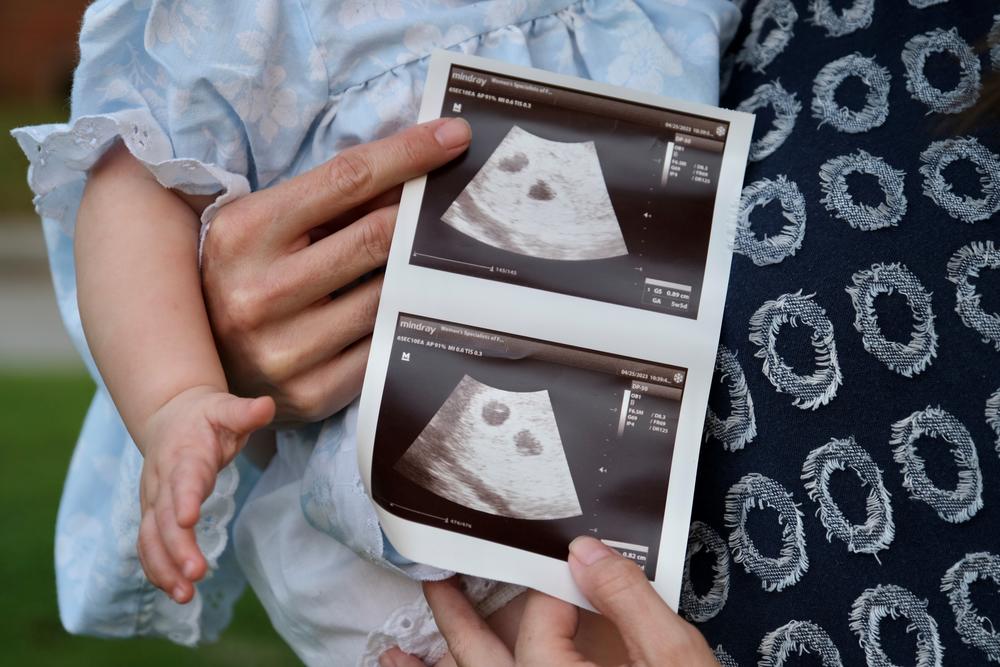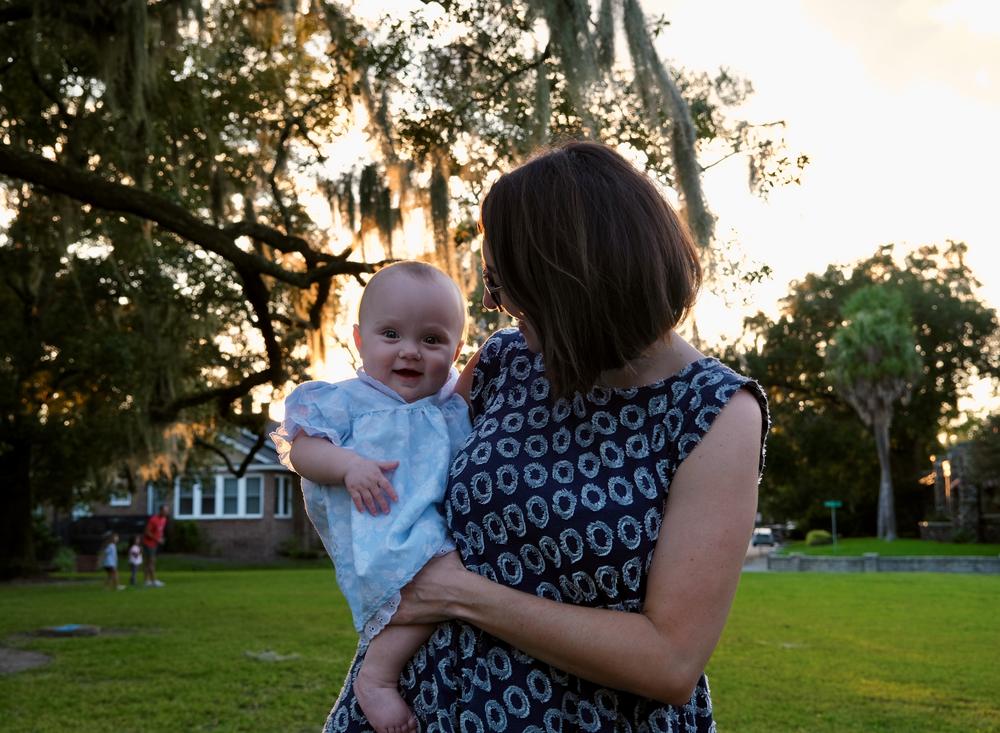
Caption
Ultrasound images from Callie Beale's pregnancy show daughter Kit and a twin brother.
Credit: Benjamin Payne / GPB News
LISTEN: Savannah resident Callie Beale shared that Georgia's six-week abortion ban forced her out-of-state for a medically necessary procedure, causing a dangerous delay in care that jeopardized her life and her daughter. GPB's Benjamin Payne reports.

Ultrasound images from Callie Beale's pregnancy show daughter Kit and a twin brother.
Next week's presidential election will be the first since the U.S. Supreme Court overturned Roe v. Wade in 2022, ending the constitutional right to abortion access and effectively clearing the way for Georgia's six-week abortion ban to take effect.
Abortion rights have emerged as a key issue in the election: a recent survey conducted by the health research nonprofit KFF found that it is the single-most important issue to women voters under 30.
It is also the top issue to Savannah voter Callie Beale, a 37-year-old artist and self-described Jesus follower.
When Beale found out last year that she was pregnant with twins — a boy and a girl — she was elated. But genetic testing and an ultrasound revealed that the boy had a severe chromosomal problem.
Her doctor said that he wouldn't make it to birth.
“And he explained to me that allowing him to continue to collect fluid would kill my healthy twin and possibly me as well,” Beale said. “So, what he recommended was a procedure called a selective reduction.”
But because it would have occurred after fetal cardiac activity was detected — which happens around six weeks of pregnancy, before many women know that they are pregnant — Beale was prohibited from undergoing the potentially life-saving procedure, due to Georgia's abortion law.
On its face, it might seem that exceptions written into the law — including for the life and health of the mother and when there is a non-viable pregnancy — would have allowed for the selective reduction. Beale thought as much when talking to her doctor.
“‘You've told me that my life is in danger, as well as the fact that I have a non-viable pregnancy for one of my twins,’” Beale recalls saying. “So, clearly I should be able to receive this care in the state of Georgia.”
That wasn't enough, Beale was told.
“I could not receive care until I was actively in said emergency, which would put my daughter's life at risk,” Beale said. “And I was not willing to wait around for that.”
Four weeks later, Beale went to New York to undergo the selective reduction that she was denied in Georgia.
Because of the four-week delay in care, though, Beale said that her own health would later deteriorate in Georgia while still pregnant with her daughter.
“My body started to turn septic,” she said. “My lactate levels [and] my white blood count levels skyrocketed. And the doctor said that, unfortunately, they were going to have to then give me an abortion for my completely healthy daughter because I was turning septic, and allowing her to live inside me would kill me.”
Her body recovered on its own, but her daughter Kit was born pre-term at 27 weeks with a brain bleed, lung issues and retinopathy.
“My delay in care could have caused her devastating issues throughout her life,” Beale said of Kit, who just turned 1 year old. “It's sheer luck that she's perfectly happy and healthy.”

Callie Beale holds her daughter, Kit, at McCauley Park in Savannah.
Although grateful for how things turned out, Beale was left furious by Georgia's abortion law and its impact on her and Kit.
“I was outraged that when I needed the reduction at 12 weeks, it was denied to me for my son that was incompatible with life,” she said. “But for my healthy daughter, who had no issues, they were able and willing to abort her because of the complications due to my delay in receiving care.”
Experiences like Beale's are becoming increasingly common in Georgia, according to Dr. Carrie Cwiak, an Atlanta OB-GYN and Emory University School of Medicine professor.
Testifying at a U.S. Senate subcommittee hearing on human rights convened by Georgia U.S. Sen. Jon Ossoff in September, Cwiak said that complicated pregnancies have become all the more complicated under Georgia's abortion law.
“Physicians, myself included, have seen patients in the ICU with sepsis, with renal failure, needing tube feeds, with hemorrhage, needing blood transfusions or a hysterectomy, who would not have been in those positions if we had been able to offer them care to avoid further harm,” Cwiak said.
At least two Georgia women have died because of Georgia's abortion law, according to reporting by ProPublica.
“Make no mistake: this restrictive ban has increased maternal mortality and poor health outcomes,” Cwiak said. “In Georgia and other restrictive states, we have learned of case after case of pregnant women being turned away or experiencing delays in their care.”
Georgia's abortion law relies on language that is not used in the practice of medicine, Cwiak added, saying that “complex medical situations cannot be distilled into a law with strict limitations, especially when they don't make medical sense.”
Beale agrees.
“There are so many things that can go wrong in both the pregnant woman's body and the fetus's body that the law is never going to be able to clearly define each individual case,” Beale said. “And it is my belief that, as a mother, I should have been able to act without the government's interference in order to save my daughter's life.”
Georgia Gov. Brian Kemp, who signed the state's six-week abortion ban into law, has called the legislation “very simple but also very powerful: a declaration that all life has value, that all life matters and that all life is worthy of protection.”
Former President Donald Trump has taken credit for reshaping the Supreme Court to overturn Roe v. Wade — as three of the six Supreme Court justices who voted to end the precedent were nominated by Trump — and has said that abortion policy should be left up to state governments.
Although Trump stated for the first time in October that he would veto a federal abortion ban if Congress were to pass one, legal experts have said that he could still implement a de facto ban through federal agencies under his control and through judicial appointments.
Vice President Kamala Harris has called state abortion bans — including Georgia's — “Trump abortion bans,” describing the former president as the “architect” of an ongoing reproductive healthcare crisis faced by women.
Harris has pledged that if Congress passes a bill to restore abortion rights, she would sign it into law.
Beale said that she will be voting for Harris.